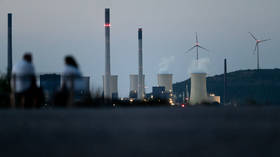Germany risks deindustrialization — The Economist

The biggest challenge the German industrial sector currently faces is posed by rising energy costs, The Economist reported on Sunday, citing the association of German industry BDI.
“The substance of our industry is under threat,” BDI President Siegfried Russwurm said as quoted by the media, adding that the situation was looking “toxic” for many businesses.
According to the association, the electricity price for next year has already increased fifteen-fold, and the price of gas ten-fold. In July, the country’s industry, which has been forced to reduce production capacities, reportedly consumed 21% less gas than in the same month in 2021.
Smaller companies are struggling more than bigger ones, according to a study by the consulting company FTI Andersch, as cited by the media. Some 25% of firms with fewer than 1,000 employees were forced to cancel or decline orders, or are planning to do so, compared with 11% of those with over 1,000 employees.
Almost 10,000 bread manufacturers are reportedly struggling as never before in post-war Germany, as the cost of the electricity and gas needed to heat ovens and run kneading machines have increased enormously.
The BDI survey of 600 medium-sized companies showed that nearly one in ten interrupted or reduced output because of high input costs, while more than nine in ten said that the soaring prices of energy and raw materials is a big or an existential challenge for them.
One in five are reportedly considering relocating part or all of their production to another country. Bigger companies that use energy-intensive production capacities, such as chemicals or steel producers, may also relocate abroad, as they have to compete with rivals in other countries, where the cost of energy is lower.
If energy prices remain high for a while, up to 3% of Germany’s energy-intensive businesses will relocate abroad, according to Holger Schmieding, the chief economist of private bank Berenberg.
For more stories on economy & finance visit RT's business section













